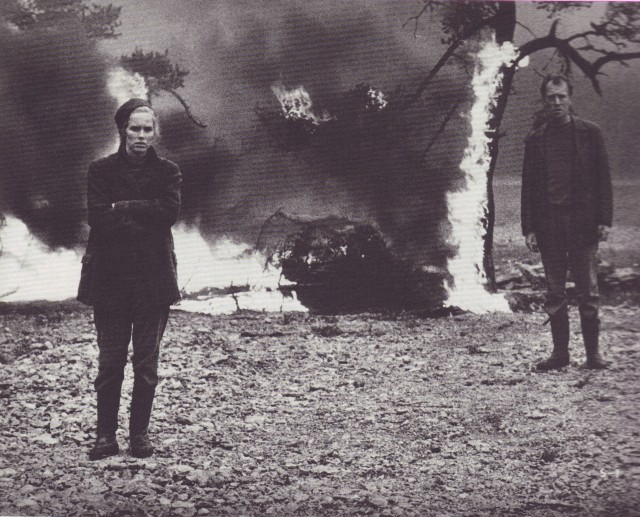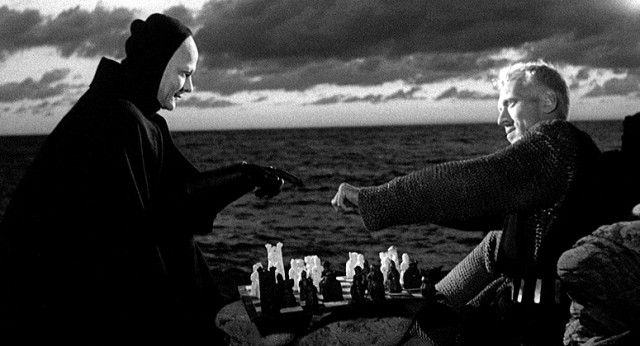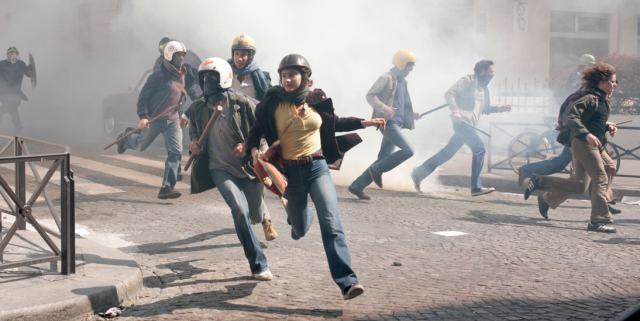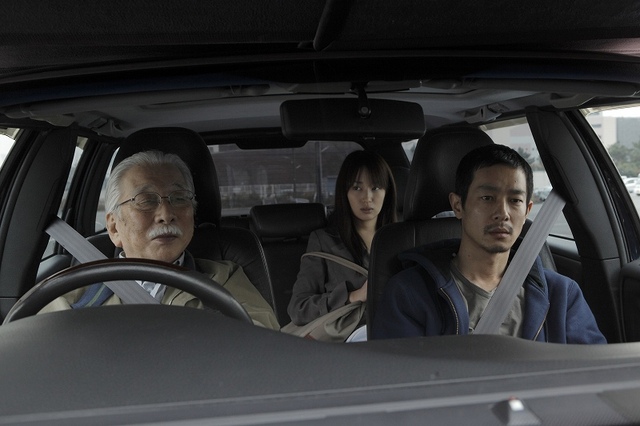HOUR OF THE WOLF (VARGTIMMEN) (Ingmar Bergman, 1968)
BAMcinématek, BAM Rose Cinemas
30 Lafayette Ave. between Ashland Pl. & St. Felix St.
Friday, November 30, 4:30 & 9:15
Series runs through December 14
718-636-4100
www.bam.org
 One of Ingmar Bergman’s most critically polarizing films — the director himself wrote, “No, I made it the wrong way” three years after its release — Hour of the Wolf is a gripping examination of an artist’s psychological deterioration. Bergman frames the story as if it’s a true tale being told by Alma Borg (Liv Ullmann) based on her husband Johan’s (Max von Sydow) diary, which she has given to the director. In fact, as this information is being shown in words onscreen right after the opening credits, the sound of a film shoot being set up can be heard behind the blackness; thus, from the very start, Bergman is letting viewers know that everything they are about to see might or might not be happening, blurring the lines between fact and fiction in the film itself as well as the story being told within. And what a story it is, a gothic horror tale about an artist facing both a personal and professional crisis, echoing the life of Bergman himself. Johan and Alma, who is pregnant (Ullmann was carrying Bergman’s child at the time), have gone to a remote island where he can pursue his painting in peace and isolation. But soon Johan is fighting with a boy on the rocks, Alma is getting a dire warning from an old woman telling her to read Johan’s diary, and the husband and wife spend some bizarre time at a party in a castle, where a man walks on the ceiling, a dead woman arises, and other odd goings-on occur involving people who might be ghosts. Bergman keeps the protagonists and the audience guessing as to what’s actually happening throughout: The events could be taking place in one of the character’s imaginations or dreams (or nightmares), they could be flashbacks, or they could be part of the diary come to life. Whatever it is, it is very dark, shot in an eerie black-and-white by Sven Nykvist, part of a trilogy of grim 1968-69 films by Bergman featuring von Sydow and Ullmann that also includes Shame and The Passion of Anna. Today, Hour of the Wolf feels like a combination of Roman Polanski’s Rosemary’s Baby and Stanley Kubrick’s The Shining with elements of Mozart’s The Magic Flute — which Bergman would actually adapt for the screen in 1975 and features in a key, extremely strange scene in Hour of the Wolf. But in Bergman’s case, all work and no play does not make him a dull boy at all. Hour of the Wolf is screening November 30 at BAM as part of the BAMcinématek series “Max von Sydow,” consisting of twenty-two wide-ranging films celebrating the outstanding career of the now-eighty-three-year-old Swedish actor; the festival continues with such other works as William Friedkin’s The Exorcist, Bille August’s Pelle the Conqueror,, Woody Allen’s Hannah and Her Sisters, John Milius’s Conan the Barbarian, and, yes, Mike Gordon’s Flash Gordon, with von Sydow playing Ming the Merciless.
One of Ingmar Bergman’s most critically polarizing films — the director himself wrote, “No, I made it the wrong way” three years after its release — Hour of the Wolf is a gripping examination of an artist’s psychological deterioration. Bergman frames the story as if it’s a true tale being told by Alma Borg (Liv Ullmann) based on her husband Johan’s (Max von Sydow) diary, which she has given to the director. In fact, as this information is being shown in words onscreen right after the opening credits, the sound of a film shoot being set up can be heard behind the blackness; thus, from the very start, Bergman is letting viewers know that everything they are about to see might or might not be happening, blurring the lines between fact and fiction in the film itself as well as the story being told within. And what a story it is, a gothic horror tale about an artist facing both a personal and professional crisis, echoing the life of Bergman himself. Johan and Alma, who is pregnant (Ullmann was carrying Bergman’s child at the time), have gone to a remote island where he can pursue his painting in peace and isolation. But soon Johan is fighting with a boy on the rocks, Alma is getting a dire warning from an old woman telling her to read Johan’s diary, and the husband and wife spend some bizarre time at a party in a castle, where a man walks on the ceiling, a dead woman arises, and other odd goings-on occur involving people who might be ghosts. Bergman keeps the protagonists and the audience guessing as to what’s actually happening throughout: The events could be taking place in one of the character’s imaginations or dreams (or nightmares), they could be flashbacks, or they could be part of the diary come to life. Whatever it is, it is very dark, shot in an eerie black-and-white by Sven Nykvist, part of a trilogy of grim 1968-69 films by Bergman featuring von Sydow and Ullmann that also includes Shame and The Passion of Anna. Today, Hour of the Wolf feels like a combination of Roman Polanski’s Rosemary’s Baby and Stanley Kubrick’s The Shining with elements of Mozart’s The Magic Flute — which Bergman would actually adapt for the screen in 1975 and features in a key, extremely strange scene in Hour of the Wolf. But in Bergman’s case, all work and no play does not make him a dull boy at all. Hour of the Wolf is screening November 30 at BAM as part of the BAMcinématek series “Max von Sydow,” consisting of twenty-two wide-ranging films celebrating the outstanding career of the now-eighty-three-year-old Swedish actor; the festival continues with such other works as William Friedkin’s The Exorcist, Bille August’s Pelle the Conqueror,, Woody Allen’s Hannah and Her Sisters, John Milius’s Conan the Barbarian, and, yes, Mike Gordon’s Flash Gordon, with von Sydow playing Ming the Merciless.


 Ingmar Bergman’s Shame is a brilliant examination of the physical and psychological impact of war, as seen through the eyes of a happily married couple who innocently get caught in the middle of the brutality. Jan (Max von Sydow) and Eva Rosenberg (Liv Ullmann) have isolated themselves from society, living without a television and with a broken radio, maintaining a modest farm on a relatively desolate island a ferry ride from the mainland. As the film opens, they are shown to be a somewhat ordinary husband and wife, brushing their teeth, making coffee, and discussing having a child. But soon they are thrust into a horrific battle between two unnamed sides, fighting for reasons that are never given. As Jan and Eva struggle to survive, they are forced to make decisions that threaten to destroy everything they have built together. Shot in stark black-and-white by master cinematographer Sven Nykvist, Shame is a powerful, emotional antiwar statement that makes its point through intense visual scenes rather than narrative rhetoric. Jan and Eva huddle in corners or nearly get lost in crowds, then are seen traversing a smoky, postapocalyptic landscape riddled with dead bodies. Made during the Vietnam War, Shame is Bergman’s most violent, action-filled film; bullets can be heard over the opening credits, announcing from the very beginning that this is going to be something different from a director best known for searing personal dramas. However, at its core, Shame is just that, a gripping, intense tale of a man and a woman who try to preserve their love in impossible times. Ullmann and von Sydow both give superb, complex performances, creating believable characters who will break your heart. Shame is screening November 30 at BAM as part of the BAMcinématek series “Max von Sydow,” consisting of twenty-two wide-ranging films celebrating the outstanding career of the now-eighty-three-year-old Swedish actor; the festival continues with such other works as William Friedkin’s The Exorcist, Bille August’s Pelle the Conqueror,, Woody Allen’s Hannah and Her Sisters, John Milius’s Conan the Barbarian, and, yes, Mike Gordon’s Flash Gordon, with von Sydow playing Ming the Merciless.
Ingmar Bergman’s Shame is a brilliant examination of the physical and psychological impact of war, as seen through the eyes of a happily married couple who innocently get caught in the middle of the brutality. Jan (Max von Sydow) and Eva Rosenberg (Liv Ullmann) have isolated themselves from society, living without a television and with a broken radio, maintaining a modest farm on a relatively desolate island a ferry ride from the mainland. As the film opens, they are shown to be a somewhat ordinary husband and wife, brushing their teeth, making coffee, and discussing having a child. But soon they are thrust into a horrific battle between two unnamed sides, fighting for reasons that are never given. As Jan and Eva struggle to survive, they are forced to make decisions that threaten to destroy everything they have built together. Shot in stark black-and-white by master cinematographer Sven Nykvist, Shame is a powerful, emotional antiwar statement that makes its point through intense visual scenes rather than narrative rhetoric. Jan and Eva huddle in corners or nearly get lost in crowds, then are seen traversing a smoky, postapocalyptic landscape riddled with dead bodies. Made during the Vietnam War, Shame is Bergman’s most violent, action-filled film; bullets can be heard over the opening credits, announcing from the very beginning that this is going to be something different from a director best known for searing personal dramas. However, at its core, Shame is just that, a gripping, intense tale of a man and a woman who try to preserve their love in impossible times. Ullmann and von Sydow both give superb, complex performances, creating believable characters who will break your heart. Shame is screening November 30 at BAM as part of the BAMcinématek series “Max von Sydow,” consisting of twenty-two wide-ranging films celebrating the outstanding career of the now-eighty-three-year-old Swedish actor; the festival continues with such other works as William Friedkin’s The Exorcist, Bille August’s Pelle the Conqueror,, Woody Allen’s Hannah and Her Sisters, John Milius’s Conan the Barbarian, and, yes, Mike Gordon’s Flash Gordon, with von Sydow playing Ming the Merciless.
 It’s almost impossible to watch Ingmar Bergman’s The Seventh Seal without being aware of the meta surrounding the film, which has influenced so many other works and been paid homage to and playfully mocked. Over the years, it has gained a reputation as a deep, philosophical paean to death. However, amid all the talk about emptiness, doomsday, the Black Plague, and the devil, The Seventh Seal is a very funny movie. In fourteenth-century Sweden, knight Antonius Block (Max von Sydow) is returning home from the Crusades with his trusty squire, Jöns (Gunnar Björnstrand). Block soon meets Death (Bengt Ekerot) and, to prolong his life, challenges him to a game of chess. While the on-again, off-again battle of wits continues, Death seeks alternate victims while Block meets a young family and a small troupe of actors putting on a show. Rape, infidelity, murder, and other forms of evil rise to the surface as Block proclaims “To believe is to suffer,” questioning God and faith, and Jöns opines that “love is the blackest plague of all.” Based on Bergman’s own play inspired by a painting of Death playing chess by Albertus Pictor (played in the film by Gunnar Olsson), The Seventh Seal, winner of a Special Jury Prize at Cannes, is one of the most entertaining films ever made. (Bergman fans will get an extra treat out of the knight being offered some wild strawberries at one point.) The Seventh Seal is screening November 27 at BAM, kicking off the BAMcinématek series “Max von Sydow,” consisting of twenty-two wide-ranging films celebrating the outstanding career of the now-eighty-three-year-old Swedish actor. Von Sydow has appeared in such other serious fare as Bergman’s The Virgin Spring and Shame, such thrillers as Sydney Pollack’s Three Days of the Condor and Martin Scorsese’s Shutter Island, such epics as Bille August’s Pelle the Conqueror and Jan Troell’s The Emigrants, and such comedies as Rick Moranis and Dave Thomas’s Strange Brew and Woody Allen’s Hannah and Her Sisters. In addition, he’s been in two of the biggest bombs ever, Mike Gordon’s Flash Gordon (as Ming the Merciless!) and David Lynch’s Dune, was the older priest in William Friedkin’s The Exorcist, and he even played Blofeld in Irvin Kershner’s Never Say Never Again opposite Sean Connery’s James Bond. Of course, no matter what the project, Sydow brings an elegance and grace to it, lifting it up and always making it a whole lot better just for his presence.
It’s almost impossible to watch Ingmar Bergman’s The Seventh Seal without being aware of the meta surrounding the film, which has influenced so many other works and been paid homage to and playfully mocked. Over the years, it has gained a reputation as a deep, philosophical paean to death. However, amid all the talk about emptiness, doomsday, the Black Plague, and the devil, The Seventh Seal is a very funny movie. In fourteenth-century Sweden, knight Antonius Block (Max von Sydow) is returning home from the Crusades with his trusty squire, Jöns (Gunnar Björnstrand). Block soon meets Death (Bengt Ekerot) and, to prolong his life, challenges him to a game of chess. While the on-again, off-again battle of wits continues, Death seeks alternate victims while Block meets a young family and a small troupe of actors putting on a show. Rape, infidelity, murder, and other forms of evil rise to the surface as Block proclaims “To believe is to suffer,” questioning God and faith, and Jöns opines that “love is the blackest plague of all.” Based on Bergman’s own play inspired by a painting of Death playing chess by Albertus Pictor (played in the film by Gunnar Olsson), The Seventh Seal, winner of a Special Jury Prize at Cannes, is one of the most entertaining films ever made. (Bergman fans will get an extra treat out of the knight being offered some wild strawberries at one point.) The Seventh Seal is screening November 27 at BAM, kicking off the BAMcinématek series “Max von Sydow,” consisting of twenty-two wide-ranging films celebrating the outstanding career of the now-eighty-three-year-old Swedish actor. Von Sydow has appeared in such other serious fare as Bergman’s The Virgin Spring and Shame, such thrillers as Sydney Pollack’s Three Days of the Condor and Martin Scorsese’s Shutter Island, such epics as Bille August’s Pelle the Conqueror and Jan Troell’s The Emigrants, and such comedies as Rick Moranis and Dave Thomas’s Strange Brew and Woody Allen’s Hannah and Her Sisters. In addition, he’s been in two of the biggest bombs ever, Mike Gordon’s Flash Gordon (as Ming the Merciless!) and David Lynch’s Dune, was the older priest in William Friedkin’s The Exorcist, and he even played Blofeld in Irvin Kershner’s Never Say Never Again opposite Sean Connery’s James Bond. Of course, no matter what the project, Sydow brings an elegance and grace to it, lifting it up and always making it a whole lot better just for his presence.


